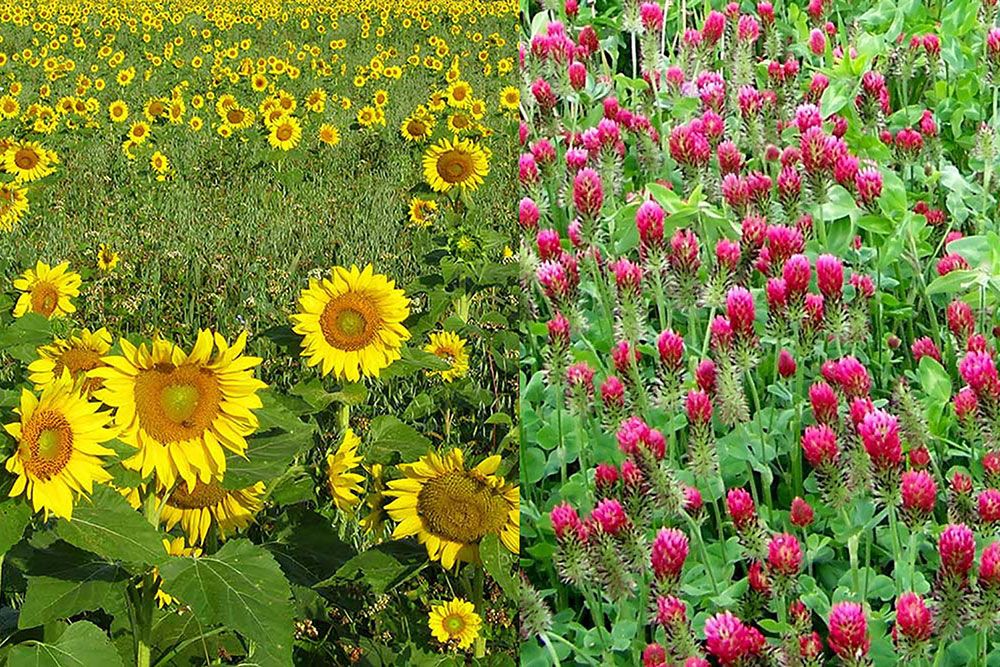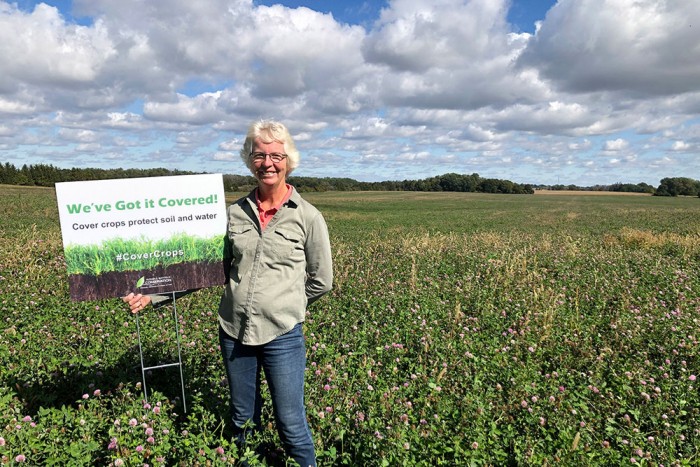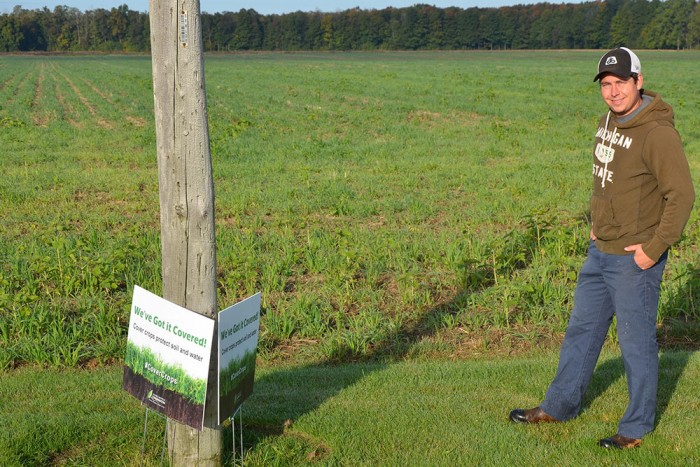Increased cover crop adoption benefits Lake Huron

By Nathan Schoelier and Mari Veliz, Ausable Bayfield Conservation
Ausable Bayfield Conservation Authority (ABCA) staff have made it a priority for years to find ways to increase the planting of cover crops like Rye; Oats; Ryegrass; Barley; Sunflowers; and multi-species mixes.
The amount of vegetative cover in the watershed, and the length of time that plant cover is in place, help to protect and improve water quality in creeks, rivers and Lake Huron. Cover crops do this by building soil health, absorbing and holding water, and reducing soil erosion and runoff.
Local agricultural producers and other rural landowners have increased cover crop planting. They have done this with support of ABCA staff members who work with funding partners to find grant dollars for incentives. These grants help reduce costs for landowners so they are more likely to plant cover crops. Producers attend peer-to-peer workshops, facilitated by staff, and they share cover crop best practices, challenges, and success stories. Conservation authority staff provide technical support on the ground and monitor the adoption of cover crops and how effective the cover crops are.
Staff also educate the public, and decision makers, about the important roles that cover crops, and land management, play in terms of water quality protection and improvement.
ABCA’s outreach to agricultural producers in the watershed has included January producer meetings and summer shop-talks. The conservation authority has also worked with project partners to hold demonstration farm tours. ABCA has also erected cover crop signs including a 60-inch sign for one innovative cover crop evaluation project and ‘We’ve Got It Covered’ signs at the farms of participating landowners in the Bayfield area. (During phases of the pandemic when public health requirements were more restrictive, ABCA hosted meetings by Zoom video conference for producers taking part.)
The conservation authority’s watershed stretches along Lake Huron’s shoreline from Arkona and Port Franks in the south to Bayfield, Clinton, and Seaforth in the north and – to the east of the lake – to Dublin, Staffa, Lucan and Ailsa Craig.
ABCA staff have used an adaptive management approach, to promote cover crop adoption, for more than a decade. In adaptive management, practitioners evaluate results and modify their subsequent decision-making based on changes, data, and experience.
In one example of adaptive management, one funding program changed its grant requirements to allow a single-species cover crop after corn or soybeans. This reflected challenges some producers had trying to establish more over-winter plant cover following these main crops.
Funding for cover crop programs comes from federal, provincial and county programs as well as from other organizations including foundations in the U.S. and Canada.
Different programs may have different rules, requirements, and program expectations. This is where ABCA’s staff can help to make the application process easy for landowners. Staff link landowners with funding programs in their area, help with applications if needed, and find multiple funding sources in some cases. ABCA staff also ensure fields are managed according to program guidelines so landowners meet the program expectations and receive the incentive grant to offset some of their costs.
Uptake in over-wintering cover crop incentive programs is increasing across the watershed. This is thanks to the participation of landowners; to programs that provide grants; and resources that help address other barriers to adoption that may exist.
Landowners in Ausable Bayfield watersheds have had hundreds of cover crop grant applications approved and have planted thousands of acres with the support of planting incentives.
Conservation authority staff evaluate best management practices. They measure water quality improvements at the field scale and find that vegetative cover on cropped fields reduces surface erosion.
Staff have worked with Dr. Wanhong Yang, at the University of Guelph, Watershed Evaluation Group. Researchers have found, using watershed modeling at the watershed scale, that the use of cover crops, to store and slow down water running off of fields, has water quality benefits. The retention of water by cover crops reduces downstream channel erosion which is a contributor to loading of sediment and phosphorus to downstream water bodies.
ABCA publishes the Ausable Bayfield Watershed Report Card every five years. The most recent report card (2018) looks at how much agricultural land is covered by vegetation during winter and how much is not. Overwinter cover includes wheat fields; hay and pasture; and cover crops. The 2018 report found that, in 2015, overwinter cover in the watershed ranged from six per cent to 26 per cent.
ABCA’s work with agricultural producers and other rural landowners, and other decision makers and program partners, has increased knowledge about the benefits of cover crops. The adaptive management approach, combined with grant incentives from funding partners, and the commitment shown by landowners, has also increased adoption of cover crops. We continue to evaluate cover crop adoption and efficacy and continue to conduct research, with environmental and agronomic perspectives, into cover crops.
Read the full report now:
- Supporting Cover Crop Adoption at Ausable Bayfield (2022) – 200 KB (medium-sized) PDF file
To learn more about cover crop adoption in Ausable Bayfield watersheds, visit the abca.ca website and this web page:

SIGNS RECOGNIZE COVER CROP PLANTING BENEFITS – Margaret Kroes, who farms with her husband, Jack, near Clinton, Ontario, is one of the local agricultural producers planting cover crops. Here, Margaret stands beside a new ‘We’ve Got it Covered!’ sign.

WE’VE GOT IT COVERED! – Brandon Coleman, of Coleman Farms near Kippen, Ontario, is one of the local agricultural producers planting cover crops. New signs, saying ‘We’ve Got it Covered!’ are in place at several farms of participating landowners in Bayfield and Lake Huron tributary watersheds.
